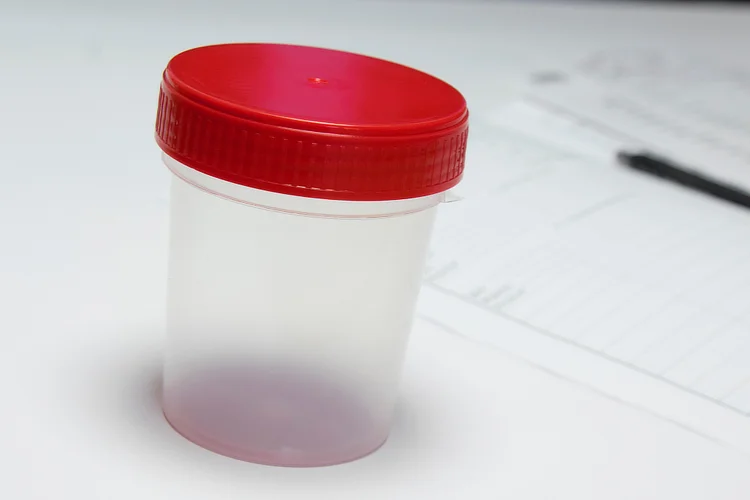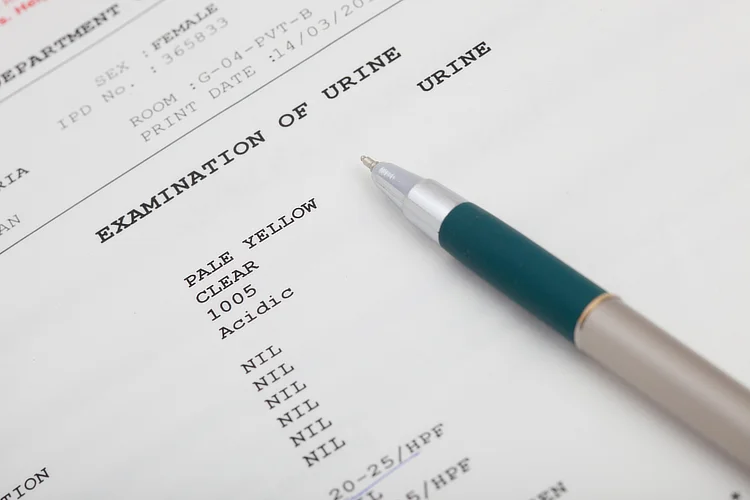Urine Test Singapore
What Is a Urine Test?
A urine test, also known as urinalysis, is a common diagnostic tool used to:
Urine tests involve collecting a urine sample and are frequently included in health screenings,
diagnostic investigations, and employment or regulatory assessments.
Urine Test Price in Singapore
At ATA Medical, we provide a variety of urine test for various purposes, including:
|
Urine Test
|
Price*
|
| Consultation |
From $49.05 |
|
General & Specialised Urinalysis
|
| Urine FEME |
$10.90 |
|
Urine Culture
|
$50.14 |
| Urine FEME + Culture |
$54.50 |
| Urine Phase Contrast Microscopy |
$32.70 |
| Urine Labstix Examination |
$10.90 |
| Urine Specific Gravity |
$10.90 |
| Urine Pregnancy |
$13.08 |
| NSU Organisms Culture (Male Only) |
$124.26 |
|
Kidney Function & Protein Monitoring
|
| Creatinine |
$19.62 |
| Microalbumin / Creatinine Ratio (ACR) |
$23.98 |
| Microalbumin (24 hr) |
$23.98 |
| Protein, Total |
$19.62 |
| Protein / Creatinine Ratio |
$23.98 |
| Creatinine Clearance Test (Blood & Urine) |
$27.25 |
|
Electrolytes & Minerals
|
| Calcium |
$19.62 |
| Chloride |
$21.80 |
| Magnesium (Random / 24 hr) |
$27.25 / $20.71 |
| Phosphate (Random / 24 hr) |
$20.71 / $19.62 |
| Potassium (Random / 24 hr) |
$10.90 / $19.62 |
| Sodium (Random / 24 hr) |
$10.90 / $19.62 |
|
Glucose & Metabolic Screening
|
| Urine Glucose (Fasting / Random) |
$10.90 |
| Alcohol (Urine) |
$49.05 |
|
Drug & Nicotine Testing
|
|
Drug Screenings
|
From $111.18 |
| Urine Barbiturates |
$54.50 |
| Urine Benzodiazepines |
$58.86 |
|
Urine Cotinine (Nicotine Testing)
|
$70.85 |
| Urine Cocaine |
$61.04 |
| Urine Methamphetamine |
$90.47 |
| Urine Morphine |
$32.70 |
|
Industrial Toxicology
|
| Aluminium Urine |
$101.04 |
| Urine Arsenic |
$70.85 |
| Urine Cadmium |
$100.28 |
| Chromium Urine |
$107.91 |
| Cobalt Urine |
$71.94 |
| Urine Copper |
$83.93 |
| Urine Lead |
$95.92 |
| Urine Manganese |
$70.85 |
| Urine Mercury |
$143.88 |
| Urine Nickel (Random / 24 hr) |
$174.40 / $177.67 |
| Selenium Urine |
$166.77 |
| Thallium Urine |
$166.77 |
| Tt-muconic (Benzene Exposure Biomarker) |
$403.30 |
| Zinc Urine |
$100.28 |
|
Cytology
|
| Urine Cytology |
$305.20 |
*Prices are NETT and inclusive of GST.
^Prices last updated on
Jan 28, 2026. While every effort is made to keep pricing information up to date, please contact our team to confirm the latest rates.
For urine tests not listed above, or if you are looking for tests as part of bundled profile
screenings or comprehensive
health screening packages, please contact us for further assistance.
For organisations, we offer corporate health screenings
or tailored test packages to meet specific workplace or regulatory requirements, conducted by Designated Workplace
Doctors (DWDs).
How Long Does a Urine Test Take?
Sample collection at our clinics usually takes 30 to 60 minutes during off-peak hours, including
registration and waiting time. Results are typically available within 1 to 3 working days, depending
on the type of test, and will be sent to you once ready.
Where Can I Get a Urine Test in Singapore?
ATA Medical has 3 easily accessible locations:
How to Book a Urine Test Appointment?
ATA Medical @ Tanjong Pagar
Address: 72 Anson Rd, #01-02 Anson House, Singapore 079911
Nearest MRT: Tanjong Pagar Station (EW15)
Contact Number: 6223 0682
Email: hi@atamed.sg
Opening Hours:
Mon - Fri: 8:30 AM to 12:30 PM, 1:30 PM to 5:30 PM
Sat: 8:30 AM to 12:30 PM
Sun & PH: Closed
Please note that our last appointment is at 5:15 PM from Monday to
Friday and at 12:15 PM on Saturday. Thank you for your
understanding.
ATA Medical @ Orchard
Address: 1 Orchard Blvd, #05-09 Camden Medical Centre, Singapore 248649
Nearest MRT: Orchard Boulevard Station (TE13)
Contact Number: 6223 0682
Email: camden@atamed.sg
Opening Hours:
Mon - Fri: 8:30 AM to 12:30 PM, 1:30 PM to 5:30 PM
Sat: 8:30 AM to 12:30 PM
Sun & PH: Closed
Please note that our last appointment is at 5:15 PM from Monday to
Friday and at 12:15 PM on Saturday. Thank you for your
understanding.
ATA Medical @ Jurong
Address: 21 Jurong Gateway Rd, #02-08 CPF Jurong
Building, Singapore 608546
Nearest MRT: Jurong East MRT Station (NS1/EW24)
Contact Number: 6348
6292
Email: jurong@atamed.sg
Opening Hours:
Mon - Fri: 8:30 AM to 12:30 PM, 1:30 PM to 5:30 PM
Sat: 8:30 AM to 12:30 PM
Sun & PH: Closed
Please note that our last appointment is at 5:15 PM from Monday to
Friday and at 12:15 PM on Saturday. Thank you for your
understanding.
Navigate to Us
Frequently Asked Questions (FAQ)
Urine tests are generally accurate when properly conducted and interpreted
in a clinical setting. Their reliability depends on the specific test,
sample quality, and whether proper collection and handling protocols are
followed. Certain factors, such as medications, hydration levels, or
contamination, may affect the results. It is advisable to consult a doctor
or specialist for personalised guidance if you have concerns about the
accuracy of a specific urine test.
A urine dipstick test screens for substances such as glucose, protein,
ketones, blood, bilirubin, nitrites, and leukocytes. It also provides
information on urine pH and specific gravity. These markers can indicate
conditions like urinary tract infections, kidney disease, or diabetes. While
convenient, dipstick results may need further laboratory confirmation for a
more precise diagnosis.
Menstrual blood can affect the accuracy of certain urine test results,
particularly those detecting blood or infection. If possible, it is
advisable to delay the test until after your period ends. If the test is
time-sensitive, inform the clinic so they can account for this when
interpreting results. It is best to consult your doctor or who can help
determine the best timing based on your needs.
Before a urine test, it is generally recommended to stay hydrated and avoid
overconsumption of fluids, as overly diluted urine may affect the results.
Certain foods, supplements, alcohol, or medications could interfere with
specific tests. Depending on the test type, fasting or other preparation may
be required. It is best to check with the clinic or your doctor for any
specific instructions.
Blood in the urine, known as haematuria, may indicate urinary tract
infections, kidney stones, trauma, or other underlying conditions. It can be
microscopic or visible to the naked eye and often requires further
evaluation to identify the cause. It is best to review your urine test
results with a doctor, who can help determine whether follow-up testing or
further investigation is needed.
A urine test report may include various parameters such as colour, clarity,
specific gravity, and chemical markers like protein, glucose, and blood.
Results are typically marked as normal or abnormal, with reference ranges
provided. However, interpreting the clinical significance of these findings
requires medical expertise. It is advisable to consult a doctor or
specialist for personalised medical guidance on your results.
Urine test prices in Singapore vary based on the type of test and whether it
is included in a screening package. At ATA Medical, individual urine tests
start from $10.90, profile screenings range from $37.06 to $250.70, and
health screening packages with urine tests start from $76. For more
information or help choosing a suitable test, please contact us.
You can get your urine tested at general practitioner (GP) clinics,
polyclinics, hospitals, or private medical centres in Singapore. ATA Medical
offers a range of urine tests at our Tanjong Pagar and Orchard clinics,
including individual tests, profile screenings, and health screening
packages. A consultation with our doctors can help determine the most
appropriate test based on your health needs.
You can test your urine at home using dipstick kits for basic indicators
like glucose, protein, or pH. While useful for general screening, home tests
may not be reliable for diagnosis and often require follow-up with
laboratory-based testing. It is advisable to consult a doctor for more
accurate interpretation and further evaluation if needed.
Yes, you can drink water before a urine test, and staying hydrated helps
with sample collection. However, avoid excessive water intake just before
the test, as it may dilute the urine and affect certain test results. Follow
any specific instructions provided by your doctor or clinic prior to
testing.
UTIs are typically tested using a urine FEME (Full Examination and
Microscopy) and, if necessary, a urine culture to check for bacteria that
may be causing the infection. These tests are available at GP clinics,
polyclinics, and private healthcare providers. Consulting a doctor or
specialist can help determine if you require testing and appropriate
treatment.
Common signs of a bladder infection include painful urination, frequent urge
to urinate, cloudy or strong-smelling urine, lower abdominal discomfort, and
the presence of blood in urine. If you experience these symptoms, it is
advisable to consult a doctor for proper diagnosis and timely treatment.
The best time to take a urine sample is typically the first morning urine,
as it is more concentrated and provides more accurate test results. However,
timing may vary depending on the specific test required. It is advisable to
follow your doctor’s instructions to ensure accurate sample collection.




